Hannah Nydahl, together with her husband Lama Ole became the first Western students of H.H. the 16th Karmapa in 1969. A qualified Buddhist teacher in her own right, she worked alongside Lama Ole from the early 1970s up to her death in 2007 to establish Diamond Way Buddhism around the world. A movie about her remarkable life and activity is currently in production. This interview was made with Hannah in 1995 and was published in the magazine Kagyu Life International. It addresses her own views about the development of Buddhism in the West and her unique role.
Interview with Hannah Nydahl, Virginia, July 1995
In 1969, Lama Ole Nydahl and his wife Hannah became the first western students of His Holiness the XVI Gyalwa Karmapa, Rangjung Rigpai Dorje, one of the greatest yogis of this century, and the head of the Kagyu tradition of Tibetan Buddhism. His Holiness had a profound influence on their lives. He asked Hannah and Ole to bring Buddhism to the West. For the last 22 years they have been traveling non-stop, teaching and setting up meditation centers around the world. Hannah Nydahl is a much sought after translator and interpretator of Tibetan Buddhist philosophy. She divides her time between translating for the lamas at the Karmapa International Buddhist Institute in New Delhi, India, participating in various Buddhist text translation projects, organizing schedules and visits of high Rinpoches in the lineage, and traveling around the world with Lama Ole.
Kagyu Life International: How did it happen that you spent so much time in Asia?
Hannah Nydahl: Ole and I went to Asia the first time in the 60’s. We connected with Buddhism and stayed there for a few years. There was no Tibetan Buddhism in the West then, so the connection with the East was still very important. My function became to translate for the Tibetan lamas, and help them organize their schedules. Also, for many years, Ole and I arranged pilgrimage tours to the East, taking approximately 100 people at a time, every year or two. This gave me a lot of contact with Asia. For the past five years I have also been involved as a translator for Tibetan teachers at KIBI (the Karmapa International Buddhist Institute) in New Delhi.
For people starting on the Buddhist path today, the situation is quite different. You can become a Buddhist in your own country, and learn and practice everything there. It may be good for your development to go on a pilgrimage, in order to visit places carrying a special blessing such as Bodhgaya, the place of Buddha’s enlightenment. But it is not necessary to go and live in the East. I only go myself when I have work to do there.
How did you learn Tibetan?
In the late 60’s when we met with Buddhism, very few texts were translated, and few teachers spoke English. We had to learn Tibetan ourselves, and I started by learning the alphabet from Tarab Tulku at the University in Denmark. Then, when we stayed in India in the Himalayas and did our practice, we had to translate all the meditation texts ourselves. When we did the Ngondro practices we started with the prostration text. I looked up almost every word in the dictionary and slowly translated the text. It was the same with the other parts of Ngondro. At that time we were in a retreat-like setting and did not talk much to people, so we did not get to practice any spoken Tibetan. To practice speaking it we had to stay in the Tibetan camps where nobody knew English.
Later, we invited the lamas to Europe and there was no one to translate, so I had to learn more Tibetan in order to translate for them. It was a natural process. Translating became part of my role, and Ole went into the teaching activity. He is a born teacher, and not a born translator (Hannah laughs). If he were to translate, he would give his own teaching (still laughing). So it fits like this.
Again, the situation today is very different. Now many teachings and texts are translated and many translators are available, so one can easily practice Tibetan Buddhism without knowing Tibetan.
How and when did you decide to give up the traditional family role? Did it happen early in your marriage?
When we went to Asia on our honeymoon and met with Buddhism, we stayed there several years to learn and practice the Buddhist teachings intensively. Later, we got the position of working full time for the Dharma. H.H. the 16th Karmapa was very precise in his instructions to us. He wanted us to go back to Europe and work for the Dharma. At that time it was not possible to combine this work with normal family life – it was a matter of making a choice. The choice was easy, there are enough children in this world, and what we were doing at that time was more important than having our own children. Today it is a different situation. Becoming a Buddhist does not mean changing one’s lifestyle as we did.
You and Ole were the ones who actually brought Tibetan Buddhism to Europe.
It became our responsibility because there was no Tibetan Buddhism available in Europe at that time. Our development was not a typical one, it was a specific function at a specific time.
How do you maintain your balance when so many people make demands on your time, and your every move is watched as being significant?
Making demands on one’s time is OK, and actually this is not a big problem. Concerning people watching one’s every move, I would like to mention something of general interest. In the West we have a tendency to become a little artificial and fanatic around our teachers. We look at the teacher, watch every move he makes, and give special meaning to each word he utters. In Europe we have this tendency quite a lot; I don’t know how it is in the States. We should try to be more natural towards teachers, towards Rinpoches. Our devotion can be kept internally – it does not have to show on the outside in an extreme way. It is not necessary to be physically close to the teacher, or look at him all the time. If one has trust or devotion, this does not have to be shown outside. It is important that, as Buddhists, we give more care to the kind of impression we make on the outside world, since people already have a hard enough time understanding what Buddhism is, and we don’t want to be confused with the many cults coming up these days.
How do you maintain your balance living in the shadow of such powerful men as Ole and Shamar Rinpoche?
No problem! (she laughs) I do not have ambitions in that way. I don’t see myself as being in anybody’s shadow. I am just myself.
In your practice of Buddhism over the last 25 years, what are the stages of development you have seen in yourself?
From the moment I first met with pure Buddhist teachings, it was like a revelation. Since childhood I always had many questions in my mind – I wondered about the meaning of existence and such things. Denmark is a Christian country, but not very religious, and the Christianity I met there did not give me the answers I was looking for. I could not accept the concept of one creator God, the rhetoric that if you did not believe in God you were doomed forever, or that people who did not believe in God were lost. This never made sense to me. I was also very concerned about what happened to the mind when one died. I wondered a lot about these things when I was very young.
Later in puberty, I was involved in a lot of mundane activities (she laughs). I got distracted, and was not so occupied with these questions. Then, I met Ole and we started taking psychedelics. For me this was a continuation of looking for answers and especially trying to explore the mind. Apart from breaking some rough concepts about the world being solid and real, and thus getting a taste of the illusory nature of things, psychedelics did not give any answers either. The problem with them was that one clung to the experiences as being real instead, which was even worse and more difficult to purify.
The first direct Buddhist teachings I read were in a book called Tibetan Yoga and Secret Doctrines in 1968. In the beginning of the book was a text by Gampopa The Garland of Precious Jewels, translated by Evans-Wenz. This is a collection of teachings presented in sets of advice that starts on an ordinary relative level and takes you through to the absolute teachings. It gave answers to all the things I had wondered about. It was a very strong experience for me, like coming home.
After that, we met our teacher the Karmapa, and started to practice. Ever since then, it has been a process of trying to integrate the teachings as much as possible. It is amazing how vast and profound the teachings are, there is no end to them. Every instruction and practice I was given always confirmed the truth of Buddha’s teachings and took me deeper into understanding. Feeling how much the Dharma has helped me, and seeing how much benefit it has for other people too, I feel extremely grateful to be able to use my life the way I do.
Have you ever doubted or been discouraged about the Dharma?
No. If something unpleasant or disappointing happens, it only confirms what the teachings say about the impermanent and changing quality of everything conditioned. As a child, I had an easy life, which maybe is not always so useful for learning to deal with difficulties, but at the same time it helped me gain some inner stability which has been useful in my later work.
How can one maintain a pure view and not be naive?
This is where the Dharma helps you. If you do not know the Dharma, then you tend to live in some unrealistic illusion and think that things are what they are not; you give things a permanent existence which they do not have. You may think something is wonderful, then suddenly it is not wonderful anymore. Or you see defects, start judging and thinking everything is terrible, there is no solution and you want to commit suicide or whatever. I can understand how people can get desperate if they don’t know the Dharma – those who look at the world without seeing the whole picture can be terrified by what they see. But once you know the Dharma, it is not so bad. You can see the potential in people, get the right perspective. Even when there are wars and catastrophes, you know, at least theoretically, that this is not how things really are, and it is only a question of everybody understanding the true nature of things for these sufferings to stop. If you meet people who behave strangely, you do not take it personally. You think more of how you can advise them. It is no longer a private thing. This is how the Dharma helps us. To have the pure view means to see how things are in their essence.
What about the situation when people who are close to you turn against you?
The teachings say that we can understand impermanence by seeing how friends turn into enemies and enemies turn into friends. This is very true. Of course it is sad when a good friend turns against you, something is destroyed, but this has not happened to me as much as to Ole. Because of his function and dominant appearance, he is in more situations where people either adore or hate him. Some people like to see him as their idol and try to imitate him. Sometimes it is these exact same people who turn against him out of pride and jealousy – they suddenly make Ole into the devil. Ole does not take this personally. It is a pity when it happens but we learn a lot through this. One learns about the mentality of people and about the different approaches people can have. You learn how to deal better with situations, how to relate to people, and how to prevent these things from happening again. You can see certain tendencies in people and then be more careful about the kinds of relationship you have with these people – for their own sake.
Do you have any plans to write a book?
I have had different suggestions from people about this. One suggestion is to write a book about Dharma experiences, and another is to write about being a woman in Buddhism. It might be useful, but it is a question of time, it takes time to write a book. Ole is better at utilizing every single second – he can produce books simultaneously with his other activity. I cannot do that, so we will see what becomes possible.
Could you speak about the special role of women in the Dharma?
When you practice Buddhism, it is a very individual thing and not so much a question of whether one is a man or a woman. Each individual has his or her capacity and conditions – both outer and inner. In the West I do not see a big difference between men and women. It is more in the Eastern cultures that there is a big difference in their roles. Concerning the Buddhist methods, there is not much difference, one just has to use them. Generally, attachment is more difficult for a woman to dissolve, and men have to perhaps work more with aggressions – but it is very individual. We are all human beings, and most have a combination of disturbing emotions. So there is not that big of a difference between man and woman when it comes to practicing the Dharma.
You hold so much knowledge and wisdom from being around teachers and translating for so many years. Why don’t you teach more?
There is only so much time and I am involved in many different kinds of activities already. Once one starts something, one should do it properly. I do not mind teaching, but when I am together with Ole, it is more natural that he teaches. When I am not with him, I mainly translate and organize for the Tibetan lamas. Somehow, teaching has not been part of my activity yet. Also, His Holiness was very specific about the importance of Ole and I working together, and, if I was to have an independent teaching program on top of everything else, the already too little time we spend together would be reduced to zero.
Every teacher has a different style. This can be difficult since we tend to prefer one style and disapprove of others.
The confusion may have to do with us not distinguishing between the different kinds of teachers and thinking the teacher must be a Rinpoche or somebody very well known before we bother to listen to his teachings. One’s main teacher will naturally be somebody one likes and in whom one has confidence. It is psychologically normal to learn better and be more attentive if the teacher has a style one feels at home with. But we don’t always seem to understand that we need to study the basic teachings in order to understand and practice the path in a correct way. For this we can listen to teachers who are not necessarily enlightened or especially charismatic. In such cases the main thing is that he knows what he is talking about. If we focus more on the Dharma than on the person teaching it, we also protect ourselves against spiritual manipulation, which is good for everybody.
Kagyu Life International, No.4, 1995. Copyright ©1995 Kamtsang Choling USA
Other posts which may be of interest :
Tags: Interviews
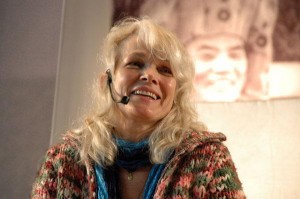
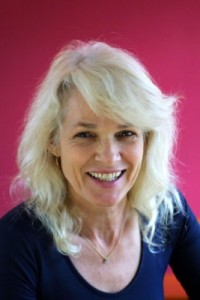
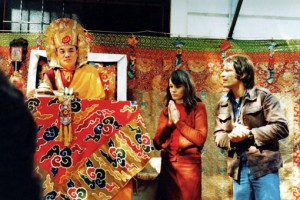
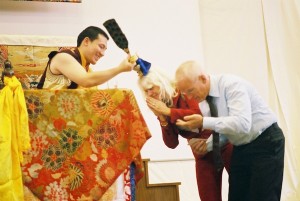

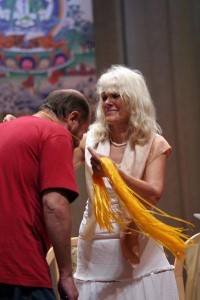


 Follow
Follow